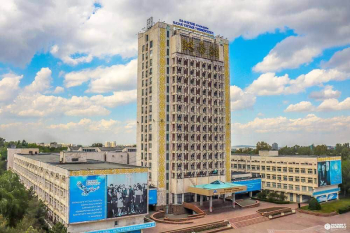The Al-Farabi Library hosted the International Farabi Forum “Al-Farabi and Spiritual Traditions of the Turkic Peoples”, organized by the Faculty of Philosophy and Political Science.
The outstanding thinker of the East Abu Nasr al-Farabi was born (870) in the city of Farab, now called Otrar, located at the confluence of the Arys River with the Syr Darya (which corresponds to the Otrar region of the South Kazakhstan region of modern Kazakhstan). He comes from the privileged strata of the Turks, as evidenced by the word “tarkhan” in his full name: Abu-Nasyr Muhammad Ibn-Muhammad Ibn-Tarkhan ibn-Uzlag al-Farabi at-Turki.In the IX-X centuries. the city of Otrar was a major political, cultural and trade center and was a key point of the caravan routes of the great Silk Road, which connected medieval Europe and Asia. Abu Nasr received the basis of scientific knowledge in Otrar, where he lived until the age of 20, where he had the opportunity to get acquainted with the philosophical and scientific works of the richest library at that time, the second in the world in terms of the number of books and manuscripts (after the famous Alexandria book depository).Then he studied and worked in Bukhara, Samarkand, for many years he lived in Baghdad, which is the cultural and political center of the Arab Caliphate. He spent the last years of his life in Cairo, Aleppo and Damascus and enjoyed great respect. In December 950, at the age of 80, al-Farabi died in Damascus.
In connection with this event, the Library. Al-Farabi organized a book exhibition.
Date: 4 April 2022
The purpose of the exhibition: To acquaint guests, students and teachers with the works of al-Farabi in the library and research work on the topic of the forum.
The exhibition consists of 4 parts:
- «Al-Farabi zhane turky alemy»
- «Al -Farabidyn enbektery»
- «Uakyt pen kenystyk ayasyndagy farabitanu»
- «Halykaralyk Farabi forymdarynyn materialdary»
«Al-Farabi zhane turky alemy» According to the theme of the forum, the exhibition will be opened by the works of Turkic-Persian scientists from the time of Al-Farabi to the present day – philosophers, poets, scientists and books on their research. In particular, al-Farabi, al-Khwarizmi, Yassaui, Balasagun, Kashgari, Yugineki, Abay, Shakarim and others. thinkers books.
«Al -Farabidyn enbektery»This section of the exhibition presents treatises published in the 20th century, stored in the library. In particular, the exposition included Al-Farabi’s “Ten-volume collected works”, published under the programs “Social and ethical treatises”, “Philosophical treatises”, “Good city” and “Cultural heritage”. In addition, the multi-volume works of al-Farabi, published by the publishing houses “Kazakh University” and “RS”, are dedicated to the 1150th anniversary of the birth of al-Farabi.
«Uakyt pen kenystyk ayasyndagy farabitanu»“Uakyt pen kenistik ayasyndagy farabitanu”. In this section of the exhibition, bio-bibliographic indexes on al-Farabi are arranged in chronological order. Al-Farabi is a great thinker of the East. al-Farabi – the great thinker of the East”, monograph “Al-Farabi and the philosophy of modern Kazakhstan”, encyclopedia “Abu Nasir Al-Farabi”. When we talk about studying the heritage of Al-Farabi, the first thing that comes to mind is Akzhan Mashani. A. Mashanova “Al-Farabi: 870-1970: historical and documentary book”, “Al-Farabi and Abay”. In addition, A. Kobesova “Al-Farabi”, “We read Al-Farabi and Abai at the same time” and others exhibited books.
«Halykaralyk Farabi forymdarynyn materialdary» The last part of the exhibition contains materials from various conferences, symposiums, forums within the framework of the International Farabi Readings, held in different years at the university and other educational institutions.
The readership of the exhibition: students, guests, readers, etc.
Documents presented at the exhibition: books, magazines, photographs.















